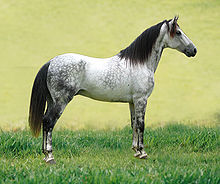Reconstruction:Proto-Japonic/uma
Proto-Japonic
Etymology 1
Possibly derived as a nativized borrowing from Old Chinese 馬 (OC *mraːʔ),[1] from Proto-Sino-Tibetan *k-m-raŋ ~ s-raŋ (“horse”). See the Proto-Sino-Tibetan entry for more details.
The ma sound denoting "horse" is common to a number of languages of central Asia, where horses were first domesticated, which has led some to speculate about a possible cognate root (but no consensus on any kind of relation exists). Compare Manchu ᠮᠣᡵᡳᠨ (morin, “horse”), Mongolian морь (morʹ, “horse”), Korean 말 (mal, “horse”), Mandarin 馬 / 马 (mǎ, “horse”), Sanskrit मर्य (márya, “stallion; young man”) and Proto-Indo-European *márkos (“horse”) and descendants such as Irish marc (“horse”, archaic) or English mare (“female horse”). More at *márkos.
Alternative reconstructions
- *muma (Vovin, 2014)
- *uma (Pellard, 2013)
- *ma
Noun
*uma

Descendants
- Old Japanese: 馬 (ma, uma, muma)
- Proto-Ryukyuan: *Cma
- Northern Ryukyuan: 烏馬 (uma) (Liúqiú guăn yìyŭ, 1469-1470)[2]
- Southern Ryukyuan: *Vma (Bentley, 2008b)
Etymology 2
Might originally be an interjection; compare English mmm.
Samuel Martin compares *ama (“sweet”).[3]
Alternative reconstructions
Adjective
*uma
Descendants
- Old Japanese: 旨, 甘, 味, 美, 巧, 美味, 甘美, 上手 (uma), 旨し, 甘し, 味し, 美し, 巧し, 美味し, 甘美し, 上手し (umasi)
- Proto-Ryukyuan: *Mma
References
- ^ Vovin, Alexander (2014) “Out of Southern China?”, in XXVIIes Journées de Linguistique d'Asie Orientale
- ^ Lin (2015)
- ^ Samuel E. Martin (1987) The Japanese Language Through Time, New Haven, London: Yale University Press, →ISBN, page 843
